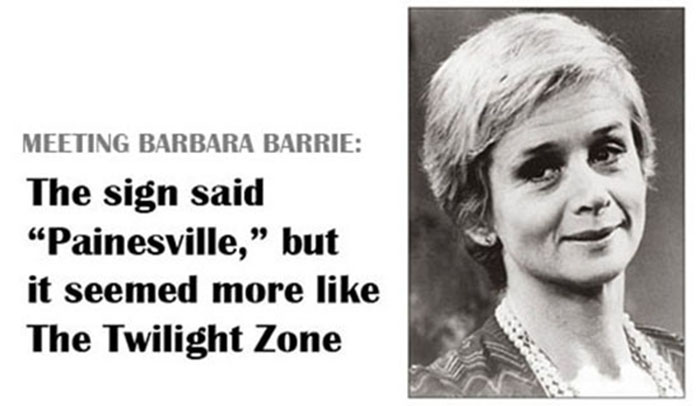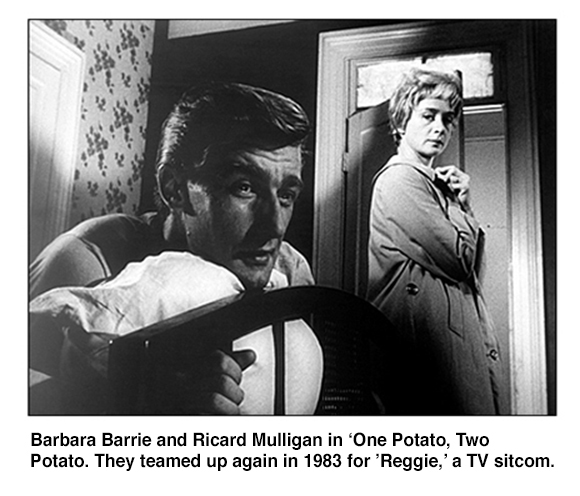October 6, 1963 / Akron Beacon Journal
By JACK MAJOR
Her name is Barbara Barrie. She is an actress ... a darn good actress ... but I’ll bet you’ve never heard of her.
Now in her 10th year of acting, Barbara Barrie remains ageless and therefore type-less. Off-screen, as well as on, she can convincingly assume the look of a teenager or a middle-aged spinster, depending on the role.
There is nothing glamorous about her. She has never posed for cheese cake, perhaps because she works more out of New York City than Hollywood.
She often seems mousy and helpless, but is attractive enough to get your attention, so she doesn’t fade into the background the way mousy, helpless people usually do. Her natural expression seems to be a plea for help and her response to every situation seems genuine, making it easy for audiences to identify with her characters.
What she seems to have in abundance is whatever it takes to become a successful character actor for a long, long time.
This isn’t to suggest Barbara Barrie isn’t busy already, at age 32. anyone who watches television should recognize her face. In the last year she appeared on more major television programs than some actors who are series regulars ... and she earned $25,000 in the process.
This year, she predicts, her earning could exceed $50,000 because she is still hot property for television programs that pay about $3,000 per performance.
Her recent success is due, in part, to the popularity of off-beat themes which put young character actors into leading roles. Fittingly, Barrie got her biggest boost from the most off-beat of the off-beat programs, “Naked City.”
She auditioned for a small part on “Naked City” two years ago. Herbert B. Leonard, executive producer of the recently canceled series, saw the performance and decided Barrie had the right style for the program. During the next 18 months he offered five scripts on “Naked City” and his other property, “Route 66.”
(Both programs have off-beat episodes as well as off-beat stories. One of her appearances on “Naked City” was in a story called “Dust Devil on a Quiet Street.” Her “Route 66” performance was inn a story called “Even Stones Have Eyes.”)
“Leonard as the first person to give me a leading role,” said Barrie. “Before that I was the original neurotic teenager on live television plays.”
Her confidence boosted, Barry left her New York apartment last year after doing a “Naked City” and went to California “on a lark.”
She found work as soon as she arrived and within three months had important roles on “Ben Casey,” “The Virginian,” “Premiere Theater,” “Twilight Zone” and other shows.
“The only back luck during that time happened back in New York,” she said. “My apartment burned.”
Barrie’s California visit also got her a featured part in the movie, “The Caretakers,” which temporarily pushed her back into her neurotic rut – she played an inmate at a mental institution.
“That’s why my favorite TV role was in ‘Twilight Zone,’ ” she said, smiling. “I was normal – my brother was the neurotic.”
(The episode was titled, “Miniature.” Robert Duvall played her brother.)
Barrie recently spent two months in nearby Painesville where she completed her first starring role in a movie, “One Potato, Two Potato.” The film will be aimed at art theaters in hopes of matching the success of last season’s sleeper, “David and Lisa.”
Some believe the film’s subject matter, based on an actual case involving a white divorcee who lost custody of her children because her second husband was black, will prevent “One Potato, Two Potato” from being shown in parts of the country.
Barrie figures the film with worth the gamble. Her 10 years of acting have given her a world of experience but very little reputation. What was the risk?
Her story is typical of people who going into acting simply because they love to act. This separates her from the men and especially the women who are lured to because of their looks and despite a complete lack of acting experience.
“Movie were the farthest thing from my mind when I arrived in New York ten years ago,” she said during our interview in Painesville on the last night of shooting. “I weighed 138 pounds (on a five-foot-five-inch frame), had a crooked teeth and a long nose. When I thought of acting, I thought of the stage, nothing else.”
She became interested in acting while a freshman at Del Mar Junior College in Corpus Christie, Texas, her hometown.
Barrie’s major at Del Mar was journalism, but the transition to acting was easy. “After all,” she said, “they’re both creative.”
She won an award at Del Mar. “It was a best actress type thing. After that I began to think I was pretty good,” she admitted.
She went next to the University of Texas “but I didn’t know whether I wanted to act or teach. I switched my major seven times before I graduated I tried switching an eighth time – from drama to drama education – but my adviser wouldn’t let me. I think he just wanted me to get out of school as quickly as possible.”
She got out in 1953 and went to New York City, a natural step for an aspiring actress.
“To tell you the truth, the only reason I went was because I had a boy friend who was living there. We were supposed to get married, but couldn’t right away. Since I had gone to all the trouble of moving to New York, I figured I might as well try to act.”
It wasn’t easy. Her first problem, she said, was hurdling the frustrating obstacle of joining Actors Equity Association, the actors’ union.
“It’s quite a circle,” she said. “You can’t join Equity unless you have a job ... and you can’t get work unless you’re a member of Equity. What do you do? Lie!
“I auditioned for a part and got it. They asked me if I belonged to Equity and I said yes. Then I went back to the Equity office and told them I had a job. It worked.”
But acting jobs were few for several months. She had to find work and wound up at a paper box company “where my job was to tear apart old magazines.”
She earned $800 that year, most of it from the paper box company.
During her second year she worked part-time at a Russian tea room. She got her meals free at the tea room and split the cost of an apartment with three roommates.
She says it took five years to become established enough as an actress that she could drop part-time times altogether. In the meantime, her original reason for going to New York – romance – had died.
Incentive to remain in New York was provided by television in 1954 when she landed the first of several part in live dramatic productions at $350 a performance. She also enrolled at an acting school and felt for the first time she was learning her craft.
“You just can’t learn in college,” she said. “You get the basic requirements at school, but you can’t learn how to act. For one thing, the college instructors don’t have the background or the acting ability.
“College instructors never get their students to look deep into themselves, thus the acting is never real. I’m glad I went to school, though, because the whole sociological experience is valuable.”
Barrie complete the first of three seasons in summer stock in 1955. “The pay wasn’t much – $65 a week – but was was regular.
Early in 1956 she went home to visit her family and her timing was perfect. Director George Stevens was in the Corpus Christi area filming “Giant,” and Barrie landed a bit part in the movie. “One scene, no dialogue” she said.
In the late 1950s she became a semi-regular on the soap opera, “Love of Life.” Some of the episodes might have been laughable. but she didn’t make fun of the show. It paid her $900 a week for several months.
In late 1958 she got a part in her first Broadway show, “The Beaux Strategem,” with June Havoc. It died after 16 performances.
She went from there to the American Shakespeare Festival in Stratford, Connecticut. In 1960 she toured Europe in “The Miracle Worker,” as part of a State Department-sponsored good-will tour.
Upon her return a friend from the casting office of the old “Kraft Theater” series recommended that Barbara audition for the “Naked City” role.
It would be dramatic to say Barbara Barrie is at the crossroads of her career, but that would be a lie. Her career probably won’t have a crossroads. It may never even have a climax.
Her career may simply continue because she views herself as a working girl. Other women pound typewriters, Barbara Barrie acts.
Sometimes it’s fun, sometimes it’s annoying, but acting is always the big thing in her life.
She is single with no immediate prospects of marriage. Paintings are her major expense (“I have six rooms full”). Otherwise she hoards her money and puts it into a savings account.
“I don’t think I’ll ever forget tearing those magazines apart in the paper box factory.” |


